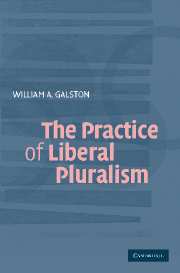Book contents
- Frontmatter
- Contents
- Acknowledgments
- 1 Introduction
- PART I PHILOSOPHICAL FOUNDATIONS OF LIBERAL PLURALISM
- PART II LIBERAL PLURALISM AND PUBLIC ACTION
- PART III POLITICS, MARKETS, AND CIVIC LIFE IN LIBERAL PLURALIST SOCIETIES
- 7 The Public and Its Problems
- 8 The Effects of Modern Markets on Civic Life
- 9 The Politics of Reciprocity: The Theory and Practice of Mutualism
- PART IV DEFENDING LIBERAL PLURALISM
- Index
9 - The Politics of Reciprocity: The Theory and Practice of Mutualism
Published online by Cambridge University Press: 18 December 2009
- Frontmatter
- Contents
- Acknowledgments
- 1 Introduction
- PART I PHILOSOPHICAL FOUNDATIONS OF LIBERAL PLURALISM
- PART II LIBERAL PLURALISM AND PUBLIC ACTION
- PART III POLITICS, MARKETS, AND CIVIC LIFE IN LIBERAL PLURALIST SOCIETIES
- 7 The Public and Its Problems
- 8 The Effects of Modern Markets on Civic Life
- 9 The Politics of Reciprocity: The Theory and Practice of Mutualism
- PART IV DEFENDING LIBERAL PLURALISM
- Index
Summary
The aim of this chapter is to offer an account of governance that is consistent with both liberal pluralist theory and some significant facts of human life under modern conditions. While in the abstract, liberal pluralism is consistent with a wide range of regime forms, practical circumstances in a given time and place are likely to narrow that range considerably. We have already encountered some of these circumstances – among them, declining political engagement, an active but ambiguous associational life, and a pervasive market. I turn now to other significant facts that delimit modern conditions, and then to their implications for governance.
THREE BUILDING BLOCKS FOR AN ACCOUNT OF GOVERNANCE
In this section, I want to develop what I regard as three building blocks for an account of governance. The first of these is individualism, understood as an ineliminable feature of modern societies. The second is an account of human motivation that asserts the reality of moderate self-interest – that is, of the capacity of normal human beings to act in ways that do not always reflect naked self-interest. The third is a moral framework that emphasizes the reciprocity and mutual responsibility stemming from political arrangements founded on choice and contract.
The Rise of Individualism
The legal scholar Lawrence Friedman argues that the United States is becoming what he calls a “republic of choice.”
- Type
- Chapter
- Information
- The Practice of Liberal Pluralism , pp. 148 - 170Publisher: Cambridge University PressPrint publication year: 2004



